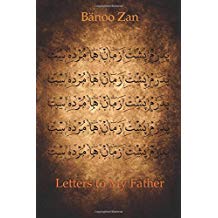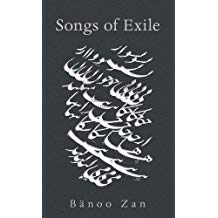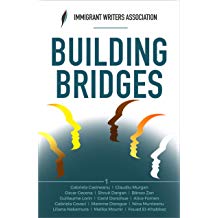As we are starting an interview series with members of the Immigrant Writers Association (IWA) and other immigrant writers, we invited Bänoo Zan to be our first guest. Why did we choose her?

Bänoo Zan is a poet, librettist, translator, teacher, editor and poetry curator, with more than 200 published poems and poetry-related pieces as well as three books: Song of Phoenix: Life and Works of Sylvia Plath, was reprinted in Iran in 2010. Songs of Exile, her first poetry collection, was released in 2016 in Canada by Guernica Editions. It was shortlisted for Gerald Lampert Memorial Award by the League of Canadian Poets in 2017. Letters to My Father, her second poetry book, was published in 2017 by Piquant Press in Canada. She is the founder of Shab-e She’r (Poetry Night), Toronto’s most diverse poetry reading and open mic series (inception: 2012). It is a brave space that bridges the gap between communities of poets from different ethnicities, nationalities, religions (or lack thereof), ages, genders, sexual orientations, disabilities, poetic styles, voices and visions.
We’ve added more details about Bänoo and Shab-e She’s at the end. Now let’s get started!
1. As a poet who published both in your country (Iran) and Canada, what do you consider the three most important aspects that immigrant poets need to consider for their Canadian career?
One: Language proficiency
Familiarity with the dominant language and the ability to express yourself in it as a poet is a must. If you want to be accepted as a Canadian* poet, you need to write in a language most Canadians can understand.
In English-speaking countries, there is little, if any, interest in translated works. Do not expect to make a difference through translation, especially if you write poetry. Successful translations of poetry are acts of genius. They do not happen on a regular basis. To convince a translator that your work deserves to be rendered into a different language requires powers of persuasion greater than the power to write directly in a second language. And, it doesn’t guarantee everlasting fame or recognition for you as a poet! As a poet and a poetry translator, I do not translate poems that do not capture my imagination and heart. I do not have time to waste! And, when all other criteria are met, I do charge a fee.
In order to gain proficiency at a level acceptable for a poet, you need to work hard. You need to read, write, speak, and listen to English at the most sophisticated level possible. In a place like Toronto, you can attend readings and events and connect with fellow poets on a regular basis. You can borrow books from the Toronto Public Library and read constantly in English. You can join book clubs and reading circles or take courses in literature and poetry. You can join workshops and other professional development opportunities. You can support other writers in their journey.
If you do not develop a profile as a poet in the dominant language of the country you have chosen as your second home, your opportunities for professional development and meaningful impact will remain practically nonexistent. This does not apply to you if you have been awarded the Nobel Prize in Literature.
* You can substitute any other nationality here!
Two: Cultural competency
As a poet, artist, intellectual, and public figure, you need to develop an understanding of the country you have landed in. You need to have a deep understanding of its literary, poetry, publishing, and performing, past and present. Poetry is an expression of culture. I don’t suggest you stop caring about your land of origin or start forging a fake identity. I do suggest you enrich your cultural awareness by exposing yourself to traditions present around you, explore other cultures, and make sense of your new adopted land. The role of a poet, writer, or artist is to bridge the gap that exists among peoples and cultures. Even if you feel unprepared for this role, you will be expected to take it on once you are published. If you don’t want to be a cultural ambassador and negotiator, stop writing or publishing! Stop getting involved in art if other cultures do not matter to you! If you secretly feel that your own culture is superior to other cultures and traditions, you are a xenophobe. In that case, I can’t tell you where you belong, but you certainly do not belong to the community of poets and writers!
Three: Professionalism
This means pursuing writing through the different avenues available. It means submitting work to journals and magazines and developing a publishing portfolio. Workshops transform you into a professional poet able to distance yourself emotionally from your own work. They will give you the skills to approach your work critically through the lens of genre requirements for acceptability and excellence.
Poetry is NOT an expression of unfiltered emotions. It is an art form with a long history, conventions, and techniques of its own. The muse gives you the first draft, but that draft is far from publishable. It is up to you to bring it to perfection. Getting honest feedback on your work prepares you for the inevitable rejections when you submit your work to publications. Professional writers say that if you don’t have a hundred rejections, you are not a serious writer!
The next stage is publishing books through established reputable (even if small) publishing houses. I do not recommend self-publishing. It doesn’t do much for you as a professional poet and is usually more frustrating than rewarding. Membership in professional organizations helps you develop your profile. Some of them require publications in book format before they accept you, such as the League of Canadian Poets and Writers’ Union of Canada. Some of them accept you even if you have published a few pieces in journals and magazines, such as The Ontario Poetry Society.
Establishing yourself as a poet is a long journey. As a profession, poetry demands that you invest time, energy, and resources. Poetry is also an art: even if you do meet all the so-called formal requirements, you still need to go beyond expectations!
2. How would you describe your muse? How do you get in touch with it? In what way it shaped you as the person you are today?
As an immigrant poet immersed in the Canadian poetry scene, my muse is constantly changing. I have found that sometimes I am surprised at what I write. But, as a poet who has been writing for most of my life, I have learned to be humble in the presence of my muse. My muse has been constant in one way: she is honest, unafraid, and unexpected. She explores the politics of power, human rights, and social issues. Her interests are ever-widening. She delves into religion, myth, and sexuality and asks uncomfortable questions. I follow my muse in her brave uncensored journey. I follow my muse the same way as Alice followed her rabbit. My poetry is a record of these adventures. I have learned a lot about myself from my muse. Poetry is honest self-exploration. My muse and I may not agree about everything, but she doesn’t need to make an appointment with me before dropping by, and I stop everything else I am doing when she arrives. I give her my heart and my pen. I give her my undivided attention. I suspect she knows me better than I know her, but I have never asked her. She is far wiser than me. While sometimes I don’t know what I am doing, she usually knows what she is doing. I am grateful for her presence in my life. It is the longest, most intimate friendship I have had with anyone.
3. You’re very active on social media. What’s your perspective on using it so often? Does it help to build a career as a poet or writer? Please share 3-5 social media tips that you find most useful for someone in the literary field.
I believe that poets and writers are public figures and role models. Here are my suggestions for anyone who agrees with this premise:
One: Do have a presence on social media. This will help you develop a network of people who are interested in your activities, events, and publications. You need reviewers to write about your work. You need organizers to invite you to feature at their events. You need your name suggested for participation in panels and other opportunities. For these reasons and more, you need to have a professional presence on social media.
Two: It goes without saying that you need to support other writers and poets and be a good colleague in the writing community. You can decide in which capacities you want to support other poets, but you do need to support them.
Three: Share enough, but do not overshare. Share nothing that strangers should not know! Of course, some people can use your most positive statements against you. If this happens, don’t panic. Remember that you do need to have a few enemies. Do not go out of your way to gain any, though. If you are a thoughtful, independent thinker, you will collect enough of them over time.
Four: Do not treat social media as pages of your diary, the ears of your most trusted friends, or the mirror in your bathroom. Even posts limited to your friends can be seen by those you may not wish to see them.
Five: Do not attack people personally on social media. Keep your personal grievances against fellow humans offline. If you must vent, do not mention names. This, by the way, can get you into serious legal trouble in Canada!
Six: Use social media as a tool for peace and understanding among different communities. Don’t be racist, xenophobic, sexist, Islamophobic, anti-Semitic, ageist, ableist, homophobic, transphobic, or any other embarrassing specimen of humanity, in any language, offline or online!
4. What is your biggest wish for immigrants who want to express themselves more in writing?
I wish for a stronger presence of immigrant and refugee voices. I wish for us to bridge the divide in the extremely polarized literary scene and be voices of peace and love. In order to do that, however, we need to work hard to express ourselves eloquently and convincingly in our chosen second language. This, at times, seems impossible. But if writing is your calling, you are lucky. Give thanks for the meaningful challenges on your path!
Thank you, Bänoo!
ImmigrantWriters.com (IWA)
Bänoo Zan is a valuable IWA member and co-author of the IWA’s first anthology Building Bridges (Chapter 5).
She first presented her Immigrant Writers Manifesto at the IWA’s first AGM, and openly shares with us her knowledge and experience with the Canadian literary scene.
If you’d like to attend a Shab-e She’r (Poetry Night): it is last Tuesday of every month. Exceptions: August (no event), December (organized earlier).
Connect with Bänoo on social media and find more details on Shab-e She’r:
Photo credit (Bänoo’s portrait): Alex Usquiano



